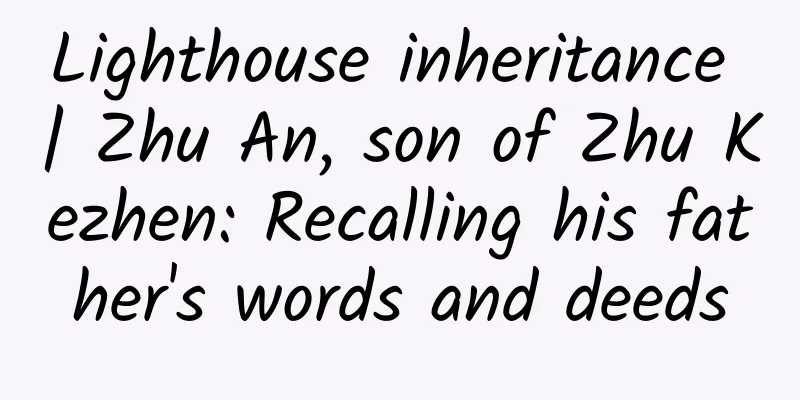|
He built a famous Chinese university known as the "Oriental Cambridge". He was affectionately called "Zhejiang University's nanny" by Zhejiang University students and teachers. He is the famous modern meteorologist and educator Zhu Kezhen.
The spirit of "seeking truth" is a spirit of "overcoming all difficulties and risking a hundred lives to seek truth." ——Zhu Kezhen Zhu Kezhen (1890-1974) was a famous meteorologist and educator in modern times. During the Anti-Japanese War, as the president of Zhejiang University, Zhu Kezhen led the school to move westward four times and built Zhejiang University into a famous Chinese university known both at home and abroad as the "Oriental Cambridge". He died on February 7, 1974 at the age of 84. Zhu Kezhen (1890-1974) was a famous meteorologist and educator in modern times. During the Anti-Japanese War, as the president of Zhejiang University, Zhu Kezhen led the school to move westward four times and built Zhejiang University into a famous Chinese university known both at home and abroad as the "Oriental Cambridge". He died on February 7, 1974 at the age of 84.
▲Zhu An (Photographer: Zhang Xinghai) Scientists' children don't seek special treatment Zhu An's home is a small three-bedroom apartment of less than 80 square meters. It was built in the 1980s and has not been renovated for decades. It still retains the appearance of the late 1990s. The living room is too small to accommodate a sofa, so Zhu An sat on a dining chair to accept our interview. Zhu An said that in fact, since 2014, he and his wife have been living in a nursing home outside the sixth ring road in the southeast of Beijing, and only occasionally return to their own home. Looking back on his life, he has been "moving" all the time. Zhu An was born in Shanghai in 1929. He is the fourth child in the family. He has an older sister, Zhu Mei, an older brother, Zhu Jin, and a second brother, Zhu Heng. When Zhu An was 1 year old, his father, Zhu Kezhen, was invited by Cai Yuanpei, the then president of the Academia Sinica, and took the whole family to Nanjing. In 1937, the Anti-Japanese War broke out. Zhu Kezhen, then president of Zhejiang University, decided to move the school westward. After many twists and turns, the final location was selected in Meitan, Guizhou. This feat of moving westward to run a school was praised by later generations as the "Long March of the Cultural Army." At that time, the young Zhu An also came to Meitan with his father, where he grew up and studied, and spent his teenage years. Zhu Kezhen held important positions in the academic world for many years and was also a famous scientist, but he lived a very simple life, was extremely self-disciplined, and had very strict requirements for his children . He did not allow them to be special, and even made them endure some "hardships" that others could not endure.
▲In 1946, Zhu Kezhen (second from left) and Zhu An (first from right) (Photo source: Zhejiang University Archives website)
For example, after graduating from university in 1950, Zhu An, who majored in chemistry, was unexpectedly assigned to work in the Zhejiang Public Security System. At that time, Zhu Kezhen was already the vice president of the Chinese Academy of Sciences, but he did not "give special treatment" to his son, but asked Zhu An to obey the organization's arrangements. It was not until 1956 that the Central Committee held a national intellectual work conference and called on technical personnel to return to the team. Zhu An was able to come to Beijing and return to his father. After Zhu An got married in 1960, he lived apart from his wife in Zhejiang. At that time, transportation was inconvenient. It took more than 20 hours to commute one way between Beijing and Hangzhou, and the couple could only see each other for several months. But Zhu Kezhen still asked Zhu An to solve this problem through organizational procedures and reasonable procedures. It was not until 1973 that the problem of Zhu An's wife and children's household registration in Beijing was finally solved. At this time, the couple had been separated for 13 years.
▲In 2017, Zhu An donated the manuscript of Zhu Kezhen's diary to Zhejiang University (Source: Zhejiang University News Network)
Interest is the best teacher Zhu Kezhen had five children in total. Among the five brothers and sisters, none of them inherited Zhu Kezhen's profession and research direction. Only Zhu An was engaged in scientific research, which was a bit surprising. But in Zhu An's view, whether he inherited his father's profession was not important. What was important was whether he could master the correct method of analyzing and understanding things like his father and inherit the spirit of scientists. When Zhu Kezhen was the president of Zhejiang University, he paid attention to both basic subject education and the cultivation of humanities. **As a father, Zhu Kezhen also attached great importance to his children's basic course learning and the improvement of their humanistic literacy. **Starting from their interests, he guided them to discover the principles of nature, society and life contained in life.
▲The first edition print of "A Preliminary Study of China's Climate Change over the Past Five Thousand Years" collected in Zhu An's home (Photo: Zhang Xinghai)
Zhu An recalled that before the Anti-Japanese War, when the family was still living in Nanjing, his second brother Zhu Heng received a birthday gift from his father, the "Junior Chemistry Laboratory". Although the laughing gas that his brother and Zhu An tried to prepare failed, they still received their father's affirmation. Zhu An's interest in chemistry was also aroused, and it became a major hobby in his youth, and he was eventually admitted to the Department of Chemistry at Zhejiang University. **In addition to improving thinking ability, Zhu Kezhen also paid great attention to the cultivation of his children's physical fitness. When Zhu An was a child, his father often took him to Nanjing Central Swimming Pool to swim. Under his father's "devil training", Zhu An, who was less than 16 years old, won the Guizhou Provincial Swimming Championship.
▲ Zhu An in the community (Photo: Zhang Xinghai) On the other hand, his father 's rigorous and meticulous "personal example" in work also benefited Zhu An a lot. **After 1928,** Zhu Kezhen served as the director of the Meteorological Institute of the Academia Sinica in Nanjing . Because weather forecasting is highly dependent on data, Zhu Kezhen required observers to record data every 6 hours. But someone overslept during the night shift and recorded the data at 1 a.m. in the 12 a.m. information. After knowing this, Zhu Kezhen was very angry. He called all the observers together and emphasized the importance of accurate observation data to them, requiring them to adhere to regular and fixed points. "Later, he simply went to check when it was close to 12 o'clock to see if the observers were on duty on time. He was relieved after several times." His father's rigorous and pragmatic style deeply influenced Zhu An and also affected Zhu An's scientific research path.
Elite gathering creates "Oriental Cambridge" When he became president in 1936, Zhu Kezhen emphasized that "professors are the soul of the university" and expressed his willingness to "do his best, be open-minded, and hire more domestic scholars with courtesy." To this end, Zhu Kezhen spared no effort to recruit outstanding talents, which became an uninterrupted work. At the beginning of his tenure in 1936, Zhu Kezhen visited Ma Yifu, who was regarded as the "treasure of Hangzhou" at the time, many times to invite him to teach at Zhejiang University, and met Ma's rather demanding requirements. However, he was still suspected of "not being sincere in his invitation" and the matter was left unresolved. It was not until 1938 that Ma Yifu, who was threatened by war, proposed to move with Zhejiang University for refuge. Zhu Kezhen did not care about Ma's repeated failure to keep his promise, and the master of Chinese studies was able to teach at Zhejiang University. With Zhu Kezhen's efforts, Zhejiang University gathered a large number of elite intellectuals in various fields at the time, and information about meetings with newly hired teachers can often be seen in his diary.
▲Zhu Kezhen (third from left in the front row) and alumni of Zhejiang University, June 22, 1939. Talents of Zhejiang University attracted the interest of other departments. In order to keep these talents in Zhejiang University, Zhu Kezhen used various tricks to deal with all parties. In 1940, National Central University intended to transfer Zhang Zhaoqian to work there, but Zhu Kezhen "tried his best to stop it" because "Zhejiang University only has Zhang in the Department of Botany". In 1941, Minister of Education Chen Lifu wanted to poach Su Buqing. " Lifu wanted to establish the Institute of Mathematics of the Academy of Sciences, and wanted to invite Hua Luogeng, Chen Xingshen from Tsinghua University and Su Buqing from Zhejiang University. Chen had agreed. Zhengzhi refused to give up Hua, and I also refused to give up Su. " It was Zhu Kezhen's long-term efforts that made Zhejiang University a stage for the gathering of academic elites at that time. In 1943, someone wrote an article analyzing the researchers in various universities in China at that time. Zhu Kezhen believed that "Zhejiang University mentioned Su Buqing, Huang Yi, Luo Zongluo, and Tan Jiazhen, but not Bei Shizhang and He Zenglu. Generally speaking, it is fair, but there are also many omissions... In terms of physics, He Zenglu and Wang Ganchang both have a solid foundation in optics and theoretical physics, but unfortunately they have no opportunity to develop." Although it was unfair that his colleagues at Zhejiang University were not recognized by the world at that time, it also reflected Zhu Kezhen's confidence in the quality of teachers. With the gathering of academic elites, Zhu Kezhen's other educational concept was gradually put into practice, "Universities are great because they embrace all kinds of things." After arriving in Yishan, Zhejiang University established a new Normal College. In January 1939, it was decided to divide the original College of Arts and Sciences into the College of Arts and the College of Science. After the victory of the Anti-Japanese War in 1945, he began to plan the establishment of the Law School and the Medical School. By the time he returned to Hangzhou in 1946, Zhejiang University had grown into a comprehensive university with 7 colleges and 27 departments, including liberal arts, science, agriculture, engineering, law, medicine, and teacher education. This was Zhu Kezhen's report card for Zhejiang University and history. In 1944, the famous British science and technology historian Joseph Needham visited Zhejiang University twice. He was deeply impressed by the rich academic atmosphere and outstanding scientific research achievements of Zhejiang University under difficult conditions. He praised Zhejiang University as one of the four best universities in China and the "Cambridge of the East" . This was both a compliment to Zhejiang University and a commendation to Zhu Kezhen.
Love students like your own children, educate talents for the country <br /> When settling new students in Tianmu Mountain, Zhu Kezhen began to try out a new system - the tutor system. He once wrote in his diary, "Since the implementation of the tutor system here, it has been quite smooth. Students feel that they have a teacher to ask questions, and teachers also have several young people as friends so they don't feel lonely... For example, yesterday Sunday, the weather was clear and cool in autumn, and the tutors and students all went out for a walk. Each of them led about 17 or 18 people, both men and women, and there was no division of departments." It was the good results of the Tianmu Mountain experiment that Zhu Kezhen decided to "implement the tutor system after arriving in Jiande, with the department head as the tutor for the third and fourth grades, and another tutor for the second grade." The tutor system began to be implemented throughout the school. This initiative was also recognized by the Ministry of Education of the National Government at that time. **In May 1938, the Ministry of Education sent personnel to inspect Zhejiang University and paid great attention to the tutor system. Later, it also praised Zhejiang University for maintaining teaching order and ensuring teaching quality among all the universities that moved west at that time. **Even under the difficult teaching conditions at that time, the teaching quality of Zhejiang University was not compromised. Because migration and air raids often led to students demanding suspension of classes, Zhu Kezhen usually opposed it "peacefully but firmly." Apart from normal relocation and risk avoidance, not suspending classes or learning was a principle that Zhu Kezhen insisted on.
▲Zhejiang University students and teachers on the ferry on their way to the west In 1940, some students were unable to graduate due to insufficient credits, poor grades, unfinished papers, and other reasons. Some students who were studying on a temporary basis were asked to drop out because of unsatisfactory grades. In the face of the pleas of some teachers and students, Zhu Kezhen did not lower the standards. But in some aspects, Zhu Kezhen was particularly supportive of the students' reasonable requests. During the Taihe period, Zhu Kezhen even allowed students to travel to nearby Xiangtan, Zhuzhou and other places for internships, and gave them allowances. This was a rare and bold decision under the conditions of the approaching war and displacement at the time. During the Anti-Japanese War, students often expressed dissatisfaction with the school on the grounds of frequent migration, the threat of war, and political darkness, and even made things difficult for and attacked Zhu Kezhen. Although Zhu Kezhen said he was "sad", he did not take tough measures. Sometimes he just ignored it when he learned that some students might take extreme actions against him. At that time, the Kuomintang government was extremely sensitive to students' political speech and behavior, and issued a so-called "warning" list to Zhejiang University many times, but Zhu Kezhen repeatedly defended the students on the "blacklist". On January 16, 1942, Zhejiang University students organized an "anti-Confucius march". Zhu Kezhen was worried that students would clash with the military and police, so he went to the scene to dissuade them. After failing, he personally led the march and told the military and police not to clash with the students. Under Zhu Kezhen's coordination, students shouted slogans and posted slogans in front, and the military and police supervised the tearing of slogans in the back, avoiding direct conflicts between the two sides. Afterwards, facing the accusations and pressure from the authorities, Zhu Kezhen tried his best to protect, rescue and exonerate the arrested students. With this kind of responsibility of "loving students like children" and "only asking right and wrong, regardless of interests", Zhu Kezhen built Zhejiang University into a democratic fortress, and Zhejiang University teachers and students also affectionately called him "Zhejiang University nanny". It was precisely because of the relaxed, inclusive and democratic atmosphere, strict control and innovation in teaching that Zhejiang University under Zhu Kezhen's administration cultivated a large number of outstanding talents such as Li Zhengdao, Ye Duzheng, Cheng Kaijia and Gu Chaohao. On November 19, 1938, at the initiative of Zhu Kezhen, the Zhejiang University School Affairs Meeting set "Seeking Truth" as the school motto. Zhu Kezhen repeatedly emphasized in his speeches that the "Seeking Truth Spirit" is a spirit of "overcoming all difficulties and risking death to seek truth", and that a strict scientific attitude must be maintained. "First, do not blindly follow or agree with others, but only ask right and wrong, regardless of interests; second, do not be arbitrary or arrogant; third, be focused and seek truth from facts" , "Seeking Truth Spirit is first of all a scientific spirit, but at the same time it is a spirit of sacrifice, struggle and revolution" . Zhu Kezhen used his actual actions to interpret what the "Seeking Truth" spirit is. His Anti-Japanese War years were a history of the perfect combination of a person and a university, a spirit and an era. With pillars like this, how can China perish?
13 years of understanding the spirit of seeking truth from diary <br /> Speaking of "Zhu Kezhen's Diary", it was in this house of less than 80 square meters that Zhu An spent a full 13 years editing and proofreading "The Complete Works of Zhu Kezhen" and "Zhu Kezhen's Diary" starting from 2000. "The Complete Works of Zhu Kezhen" includes Zhu Kezhen's documents from 1916 to 1974, and "Zhu Kezhen's Diary" is an important part of the complete works. Before that, the only record of Zhu Kezhen's writings was "Zhu Kezhen's Collected Works" published in 1979. Zhu Kezhen had the habit of keeping a diary and persisted for 38 years. Unlike the diary of a humanist, Zhu Kezhen's diary bears the obvious imprint of a scientific researcher, especially in terms of geography, climate, and phenology, with very detailed records, which became a valuable scientific asset in that era when computers were not yet popular.
▲Zhu Kezhen's diary manuscript (Source: Ruitu.com)
Although four or five decades have passed, Zhu An still remembers clearly that his father was busy with work during the day, but he insisted on writing a diary at night. If he was too sleepy, he would get up half an hour earlier the next day to make up for it, and he never stopped. Zhu An said that writers' diaries are very emotional. If there are many things to do, they will write more. If there are few things to do, they will just scribble a few lines or even not write anything. But as a scientist, Zhu Kezhen's diary is more like writing a paper or an explanatory article, especially in recording data. His professional habits make his writing feel like doing an experiment . "For example, one day in 1936, my father took a car from Nanjing to Hangzhou, a journey of more than 400 kilometers. He not only recorded in detail the distances of each station along the way, but even recorded several bicycles." Zhu An sighed and said: "I am not so serious when doing experiments myself. My father's perseverance is amazing. We often talk about the spirit of scientists today, but the spirit of scientists is not like giving lectures. There is no standardized standard. It depends more on what you do and what you accomplish." Over the past few decades, Zhu Kezhen's diary has more than 9 million words. Because it is completely handwritten and has been so old, many of the handwriting has become blurred. Zhu An read it word by word, sorted it out line by line, and reviewed the whole 13 years bit by bit. The 13 years are not only a long-distance dialogue between himself and his father, a compilation of family memoirs, but also a kind of inheritance and continuation of Zhu Kezhen's "spirit of seeking truth." In 2014, with the joint efforts of Zhu An and many scientists and editors, the compilation of "The Complete Works of Zhu Kezhen" was completed and finally published. In 2018, "The Complete Works of Zhu Kezhen" won the Book Award at the 4th China Publishing Government Award, indicating that its value has been recognized by both academia and officials.
Zhu Kezhen Class settled in Tongzhou Since January this year, with the authorization of Zhu An and the active operation of Tongzhou District Science and Technology Association, the Zhu Kezhen Science Communication Base settled in Tongzhou District, and the Zhu Kezhen Class of the Tongzhou Campus of Beijing Institute of Technology Affiliated Middle School was officially established. It will help the development of science and technology education for young people in the sub-center of the city, and also provide a broader soil for the dissemination of the spirit of scientists. As the founder of modern meteorological science in China, Zhu Kezhen has always paid attention to and "dedicated his life" to climate change research; as a pioneer of "sustainable development", he has always paid attention to China's population, resources and environmental issues; as a pioneer and practitioner of modern education in China, he served as the president of Zhejiang University for 13 years, making Zhejiang University a famous university in the country; as one of the founders and outstanding leaders of the Chinese Academy of Sciences, he has laid a solid foundation for the development of the scientific cause of New China. From the perspective of family education, Zhu Kezhen is also a textbook-like good father, and his methods of educating his children are worthy of consideration and reference by the current education community. We interviewed Zhu Kezhen's descendants and recalled his past, hoping that in the current new environment, this spirit can be carried forward and benefit more scientific and technological workers and the general public. The unsourced images in this article are from the Science and Technology Association Reform in Progress and Guangming Daily |










